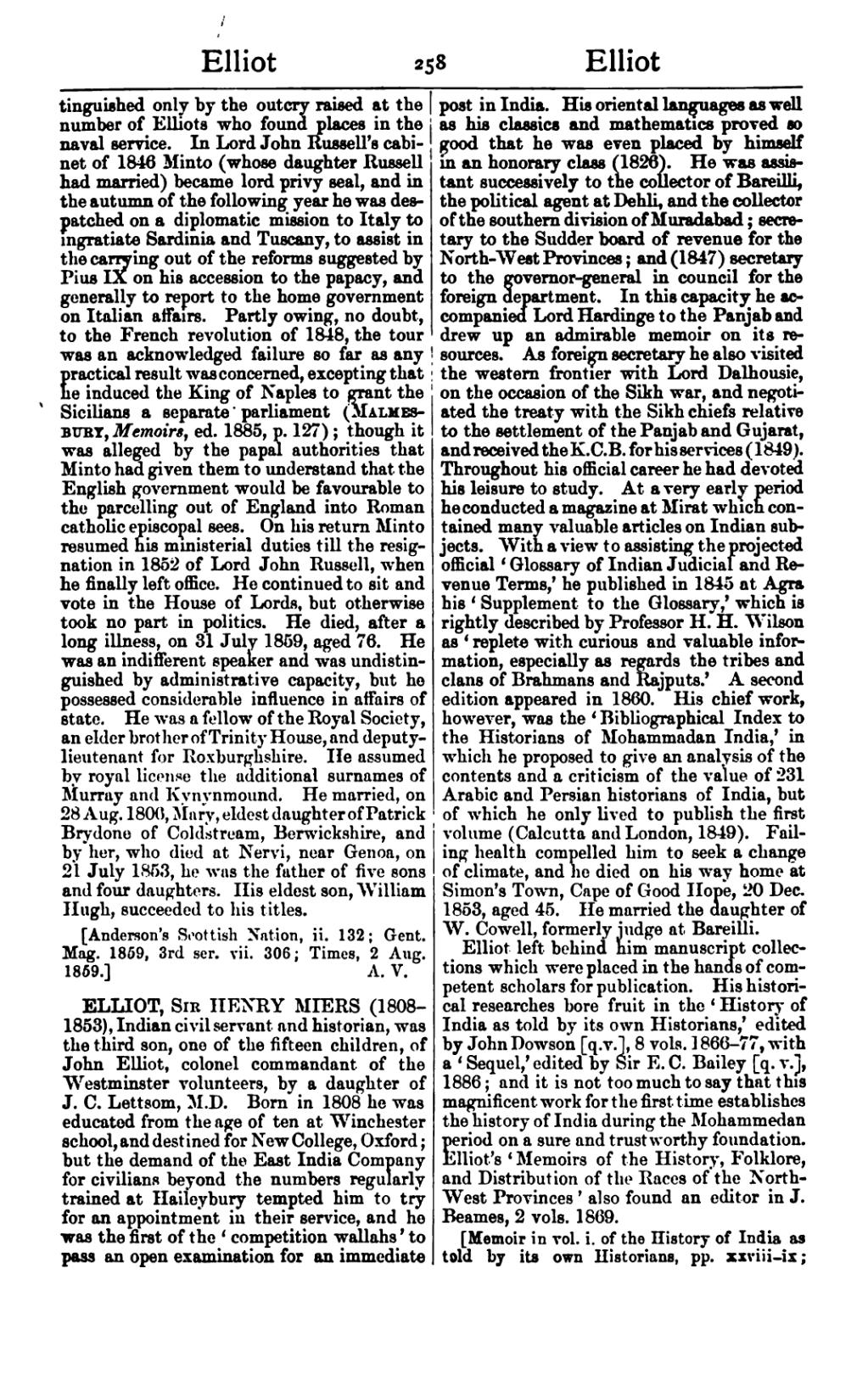tinguished only by the outcry raised at the number of Elliots who found places in the naval service. In Lord John Russell's cabinet of 1846 Minto (whose daughter Russell had married) became lord privy seal, and in the autumn of the following year he was despatched on a diplomatic mission to Italy to ingratiate Sardinia and Tuscany, to assist in the carrying out of the reforms suggested by Pius IX on his accession to the papacy, and generally to report to the home government on Italian affairs. Partly owing, no doubt, to the French revolution of 1848, the tour was an acknowledged failure so far as any practical result was concerned, excepting that he induced the King of Naples to grant the Sicilians a separate parliament (Malmesbury, Memoirs, ed. 1885, p. 127); though it was alleged by the papal authorities that Minto had given them to understand that the English government would be favourable to the parcelling out of England into Roman catholic episcopal sees. On his return Minto resumed his ministerial duties till the resignation in 1852 of Lord John Russell, when he finally left office. He continued to sit and vote in the House of Lords, but otherwise took no part in politics. He died, after a long illness, on 31 July 1859, aged 76. He was an indifferent speaker and was undistinguished by administrative capacity, but he possessed considerable influence in affairs of state. He was a fellow of the Royal Society, an elder brother of Trinity House, and deputy-lieutenant for Roxburghshire. He assumed by royal license the additional surnames of Murray and Kynynmound. He married, on 28 Aug. 1806, Mary, eldest daughter of Patrick Brydone of Coldstream, Berwickshire, and by her, who died at Nervi, near Genoa, on 21 July 1853, he was the father of five sons and four daughters. His eldest son, William Hugh, succeeded to his titles.
[Anderson's Scottish Nation, ii. 132; Gent. Mag. 1859, 3rd ser. vii. 306; Times, 2 Aug. 1859.]
ELLIOT, Sir HENRY MIERS (1808–1853), Indian civil servant and historian, was the third son, one of the fifteen children, of John Elliot, colonel commandant of the Westminster volunteers, by a daughter of J. C. Lettsom, M.D. Born in 1808 he was educated from the age of ten at Winchester school, and destined for New College, Oxford; but the demand of the East India Company for civilians beyond the numbers regularly trained at Haileybury tempted him to try for an appointment in their service, and he was the first of the 'competition wallahs' to pass an open examination for an immediate post in India. His oriental languages as well as his classics and mathematics proved so good that he was even placed by himself in an honorary class (1826). He was assistant successively to the couector of Bareilli, the political agent at Dehli, and the collector of the southern division of Muradabad; secretary to the Sudder board of revenue for the North-West Provinces; and (1847) secretary to the governor-general in council for the foreign department. In this capacity he accompanied Lord Hardinge to the Panjab and drew up an admirable memoir on its resources. As foreign secretary he also visited the western frontier with Lord Dalhousie, on the occasion of the Sikh war, and negotiated the treaty with the Sikh chiefs relative to the settlement of the Panjab and Gujarat, and received the K.C.B. for his services (1849).
Throughout his official career he had devoted his leisure to study. At a very early period he conducted a magazine at Mirat which contained many valuable articles on Indian subjects. With a view to assisting the projected official 'Glossary of Indian Judicial and Revenue Terms,' he published in 1845 at Agra his 'Supplement to the Glossary,' which is rightly described by Professor H. H. Wilson as 'replete with curious and valuable information, especially as regards the tribes and clans of Brahmans and Rajputs.' A second edition appeared in 1860. His chief work, however, was the 'Bibliographical Index to the Historians of Mohammadan India,' in which he proposed to give an analysis of the contents and a criticism of the value of 231 Arabic and Persian historians of India, but of which he only lived to publish the first volume (Calcutta and London, 1849). Failing health compelled him to seek a change of climate, and he died on his way home at Simon's Town, Cape of Good Hope, 20 Dec 1853, aged 45. He married the daughter of W. Cowell, formerly judge at Bareilli.
Elliot left behind him manuscript collections which were placed in the hands of competent scholars for publication. His historical researches bore fruit in the 'History of India as told by its own Historians,' edited by John Dowson [q. v.], 8 vols. 1866-77, with a 'Sequel,' edited by Sir E. C. Bailey [q. v.], 1886; and it is not too much to say that this magnificent work for the first time establishes the history of India during the Mohammedan period on a sure and trustworthy foundation. Elliot's 'Memoirs of the History, Folklore, and Distribution of the Races of the North-West Provinces' also found an editor in J. Beames, 2 vols. 1869.
